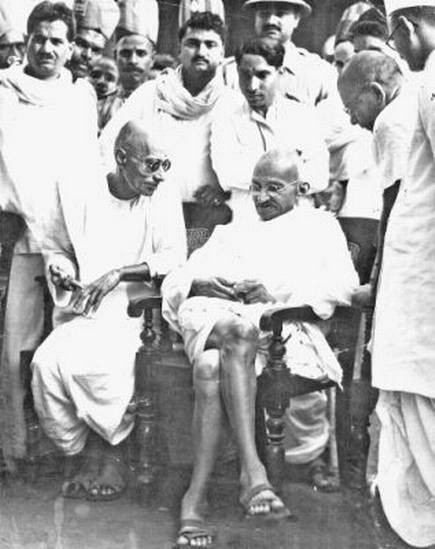 Mr. Gandhi is no more the farmer and weaver of old. The Calcutta incident has fired in him the spirit of a barrister. Setting fire to the foreign cloth, in spite of the police order, is not civil disobedience according to him. Neither is it a defiance of authority. It is a test case, a question of law. Whether a park is in a highway or not is a question of great national importance. That certainly requires immediate solution, At least before the declaration of independence on the august morning of the coming New Year’s Day. The magistrate has fined Mr. Gandhi a Rupee and the question is yet to be settled in the highest law court of the land. Bravo, Gandhi!
Mr. Gandhi is no more the farmer and weaver of old. The Calcutta incident has fired in him the spirit of a barrister. Setting fire to the foreign cloth, in spite of the police order, is not civil disobedience according to him. Neither is it a defiance of authority. It is a test case, a question of law. Whether a park is in a highway or not is a question of great national importance. That certainly requires immediate solution, At least before the declaration of independence on the august morning of the coming New Year’s Day. The magistrate has fined Mr. Gandhi a Rupee and the question is yet to be settled in the highest law court of the land. Bravo, Gandhi!
But why should you gag the poor lawyer who paid the fine imposed upon you? It is true you are a pauper and can’t pay a fine of one Rupee. That is why you are in loin-cloth. You have discarded your Kurtha and have substituted it with a Chaddar. But is not the fine imposed upon you a national dishonor? The lawyer is probably a well-meaning patriot who wants to avert a national dishonour. Your body, as you have often said, is a national trust, though your barrister conscience is in the keeping of the barrister Sen Gupta. If the nation can find for you Dodge cars and comfortable Railway conveyance, and to defray these expenses, there can be donors who can be hailed as nation’s best friends. Why should the lawyer who paid the fine imposed on be blackmailed? This is Gandhian comedy.
The story of his South Indian counterpart, Mr. Rajagopalachari nicknamed Chota Gandhi beats the short stories of his own that bristle in the columns of Young India. Famine is rife in the south. Men and women in thousands are immigrating from the villages to far off countries. A few Pavayeess and Marathals (generic names of rural Tamil women – editors) are alone left behind, because they have either their old husbands or helpless off-springs to look to. They are basking in the sunshine of an anna per day vouchsafed to them through the Khadi and Famine Relief which in reality is Brahmin Relief. The Acharya (C. Rajagopalachari – editors) and a host of his Brahmin colleagues are the people’s demi-gods. The Acharya is the Jehovah of the old spinsters. It is no wonder then that the old democratic Spinners’ Association has undergone a silent transformation and the infallible Acharya and a few of his adherents are life trustees of the Spinners’ Association, in pursuance of a scheme drafted by the Acharya himself.
Khadi work has got an art about it, which the Acharya has suddenly discovered. “Wells have all dried too”, he says, “but the patient women by a dint of miracle fill up their water-pots from the dry wells”. This, he calls, “the fine art of filling up the water-pots”. The angry gods of the Pudpupalayam Ashram that demand of Jeejays the sacrifice of their wealth when they speak of Khadi work as amounting to sweating the poor are satisfied with their glorious bounty of an anna per day. The poor have their javari and their unsatisfied hunger. What of these Puduppalayam gods themselves? They are a “happy family” who have fat salaries. They have their rice and dhal with ghee to boot. There is of course no news of their Ashram wells having dried up; but how can they be immured to the suffering of the poor on account of the scarcity of water? As a mark of sympathy for them, the demi-gods have minimized the consumption of water by substituting it with milk and coffee. They have their migrations too, from the kitchen to the prayer hall.
After all, we can’t blame them for it, for as the old proverb goes, “the Brahmin is fond of his dish.” You cannot at the same time deny the truth that the art of filling up their stomachs is as fine as the art of filling up the water jugs. They won’t stop with this.
This is only a preparation for the coming elections and they hope that their labours shall be amply rewarded ere long. Keep awake, or when you rise up from your stupor you will find that fraud would have developed into the finest of fine arts.
- Revolt, 10 April 1929
You can send your articles to This email address is being protected from spambots. You need JavaScript enabled to view it.

